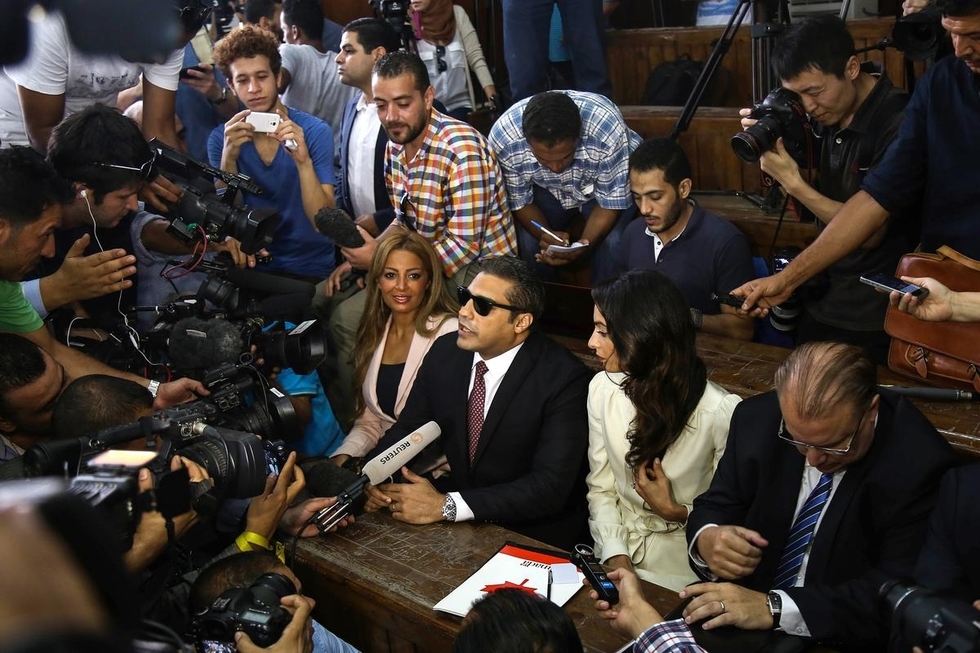What hope for press freedom in the Arab world?

The trial and retrial of Al Jazeera English journalists Peter Greste, Mohammed Fahmy and Baher Mohammed represent the most high-profile press-freedom case in Egypt, and arguably the entire Arab world, since their arrest in December 2013. Their ordeal, however, is part of a much larger crisis facing press freedom and freedom of expression in Egypt and the wider region.
The attention the case has garnered can be attributed to two main factors. Firstly, Al Jazeera has a high international profile, and so was able to wage a global campaign for its staff's freedom akin to the BBC campaign for reporter Alan Johnston, who was kidnapped in Gaza in 2007. Secondly, Greste is Australian and Fahmy Canadian - had all three defendants only had Egyptian citizenship, their plight would have been overlooked.
Journalists, bloggers and activists throughout the Arab world are facing similar injustices but with nowhere near the same level of attention or concern. Not a week goes by without local and international human rights and press-freedom groups highlighting such violations, but they seldom make headlines.
In the last week of August alone, for example, Reporters Without Borders (RSF) and the Committee to Protect Journalists (CPJ) pointed to violations in Syria, Bahrain, Lebanon, Yemen and Egypt (besides the prison sentences handed to Greste, Fahmy and Mohammed).
Arab Spring
This is a far cry from the hope that came with the start of the Arab Spring in 2011. As dictators were toppled and others threatened, some countries saw an opening up of press freedom and freedom of expression - albeit to differing and sometimes limited degrees - as a means of placating frustrated citizens.
However, as the Arab Spring stalled and regional instability and conflict ensued, regimes have clamped down once again on those freedoms, bolstered by foreign allies and renewed public fear of the repercussions of demanding their rights, particularly in light of the chaos engulfing Syria, Libya, Yemen, and to a lesser extent Egypt.
Autocrats, feeling more secure than they were in the early days of the Arab Spring, are reverting to their traditional methods of silencing dissent with an iron fist, and by raising the spectre of conflict and extremism should they be toppled (while of course ignoring their own role in these outcomes). Meanwhile, militants region-wide have shown a similar disregard for press freedom and freedom of expression.
Regression
As the saying goes, "truth is the first casualty of war" - as war rages across the region, the truth is struggling to survive. It is well known that veering from the government line is generally not tolerated in the Arab world, but such is the level of intolerance nowadays that Egypt's government has gone even further, last month explicitly criminalising media contradictions of its version of events.
"Even in countries where freedom of information is highly restricted, laws rarely suppress pluralism so blatantly," said RSF. "Egypt is sinking ever deeper into a terrible despotism that not only wants to control information and detain journalists, but also put them under even more pressure than during the Mubarak era."
Press freedom in the Arab world is even more restricted today than it was in the years leading to the Arab Spring, according to a report published in May this year by the Federation of Arab Journalists (FAJ), which studied the environment for journalists in 17 countries.
RSF's 2015 press freedom index makes for further grim reading. Of the 22 member states of the Arab League, seven are among the worst-ranked 10 percent of the 180 countries on the list. Twelve Arab states are among the worst-ranked 25 percent, and all but three are in the bottom half of the list. Ten countries are ranked lower this year than when the Arab Spring began, and eight are ranked lower than last year.
Impunity
It is little wonder that press freedom in the Arab world is in such dire straits when there are no repercussions for denying or limiting it. Domestically, government supporters - even those in the media - cheer on such crackdowns, placing opportunism above principle. There is also little to no accountability when journalists are attacked or threatened, and punishments are meted out when there is critical reporting or commentary on regional allies.
Furthermore, neither regional non-Arab states, nor outside powers most involved in the Middle East and North Africa, set a particularly good example. Israel, Turkey and Iran rank 101, 149 and 173 respectively on this year's RSF press freedom index. Just last week, Turkish authorities arrested four journalists working for Vice News, including two Britons, on allegations of ties to the Islamic State (IS) that Amnesty International described as "bizarre".
Of the five permanent UN Security Council members, Russia ranks 152 and China 176, both worse than last year. All five permanent members are happy to turn a blind eye, or at most issue meek statements, when their allies in the region violate press freedoms.
For example, Moscow - which has been courting Egyptian President Abdel Fattah al-Sisi - and Beijing - where he is currently on a state visit to boost ties - have remained silent over the sentencing of the Al Jazeera English staff.
Even when foreign powers issue something resembling condemnation, it has little weight when business is conducted as usual, and when military, economic and political backing continue unabated. That is arguably worse than silence - it is complicity, deceit and hypocrisy. Against all these odds, what hope is there for Arabs to enjoy the fundamental rights of free speech and free press that many around the world take for granted?
- Sharif Nashashibi is an award-winning journalist and analyst on Arab affairs. He is a regular contributor to Al Arabiya News, Al Jazeera English, The National, and The Middle East magazine. In 2008, he received an award from the International Media Council "for both facilitating and producing consistently balanced reporting" on the Middle East.
The views expressed in this article belong to the author and do not necessarily reflect the editorial policy of Middle East Eye.
Photo: Canadian-Egyptian Al-Jazeera journalist Mohamed Fahmy (centre), one of the three reporters sentenced to three year in jail by Egyptian court, his fiancee Marwa Omara (left) and lawyer Amal Clooney (right) are seen as Fahmy speaks to the media after a court session in the Tora prison in Cairo, Egypt, 29 August 2015. (AFP)
New MEE newsletter: Jerusalem Dispatch
Sign up to get the latest insights and analysis on Israel-Palestine, alongside Turkey Unpacked and other MEE newsletters
Middle East Eye delivers independent and unrivalled coverage and analysis of the Middle East, North Africa and beyond. To learn more about republishing this content and the associated fees, please fill out this form. More about MEE can be found here.


